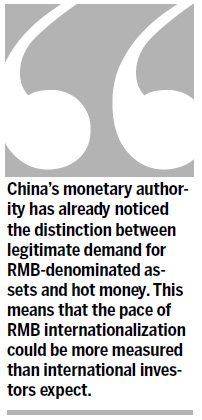Opinion
RMB's bumpy road ahead
By Yu Yongding (China Daily)
Updated: 2011-06-02 13:41
 |
Large Medium Small |
Appreciation expectations of speculators are posing challenges to internationalization of renminbi
Recently, HSBC bank released an upbeat survey predicting that China's currency, the renminbi (RMB), will become one of three global settlement currencies, alongside the dollar and euro, some time this year. The RMB's internationalization seems to have been progressing without anyone really noticing. The key remaining questions concern whether or not the RMB will become an important international currency anytime soon, and whether it is poised to pose a serious challenge to the US dollar's domination of the international monetary system.

An international currency is used and held beyond the issuing country's borders, and plays the role of unit of account, medium of exchange, and store of value for residents and non-residents alike. Certainly, there are many potential benefits for China to be gained from the RMB's internationalization:
First, the elimination of exchange-rate risks to which Chinese firms are exposed. Greater funding efficiency for Chinese financial institutions would strengthen their competitiveness in the global financial markets.
Second, it would boost China's trade with its neighbors, owing to the reduction in transaction costs. There would be less need for China to hold US dollar assets and risk capital losses on the country's foreign-exchange reserves.
Third, the RMB's status as one of the world's major reserve currencies, would provide China more freedom to maneuver in domestic and international economic policy.
China's enthusiasm for RMB internationalization since 2009 partly reflects its frustration with the lack of progress in reforming the international financial architecture, and with the state of regional financial cooperation. Chinese officials believe that RMB internationalization is a way for China to set its own agenda without being overly constrained by external conditions beyond its control.
Thus far, China has made significant progress in the use of the RMB as a settlement currency, in the issuance of RMB-denominated bonds, and in signing currency-swap agreements with foreign central banks. RMB deposits in the Hong Kong Special Administrative Region are growing exponentially.
Despite these achievements, however, RMB internationalization could still easily go awry. For example, various incentives have been provided to encourage enterprises to use the RMB to settle transactions. But, with an undervalued exchange rate and strong expectations for the RMB to appreciate in the future, foreign importers of Chinese products refuse to use the RMB to settle transactions, while foreign exporters are happy to accept RMB. As a result China ends up with more foreign-exchange reserves, even though using the RMB as a settlement currency is supposed to reduce their accumulation.
But a more fundamental problem for RMB internationalization is what it implies for China's capital controls. Although the internationalization of a currency is not tantamount to capital-account liberalization, the degree of internationalization is conditional on capital-account liberalization. The big increase in RMB deposits in the Hong Kong SAR is a case in point.
When a currency endures a prolonged process of one-way appreciation, speculative capital aimed at exchange-rate arbitrage is bound to seize all opportunities to flow in. Hot money will increase currency appreciation pressure and complicate macroeconomic management. The profit taking by speculators at the end of the game will lead to huge welfare losses to the recipient country, in this case China.
Fear of hot money was the main reason why China refused to de-peg the RMB from the dollar until July 2005. While China did decide to allow the RMB to appreciate gradually after that, it has relied on capital controls to prevent hot money from flowing in. The controls are leaky, to be sure, but they have worked - so far - which is why China has effectively maintained macroeconomic stability over the years.
The key objective of China's capital controls is to prevent non-mainland residents from holding domestic RMB-denominated assets that are unrelated to trade and long-term capital flows.
But RMB internationalization encourages non-mainland residents to hold more RMB and RMB-denominated assets. As a result of internationalization, RMB deposits held by Hong Kong SAR residents have reached 370 billion yuan ($57 billion), and the amount may reach 1 trillion yuan by the end of the year.
One might wonder what difference there is between hot money and RMB deposits held by non-mainland residents. The answer depends on why non-residents hold these deposits. The attraction of the RMB should come from China's strong economic fundamentals and faith in its economy. If it comes from expectations of RMB appreciation, the success of RMB internationalization could be easily reversed and cause more problems for China's monetary authority to solve in the future.
Fortunately, China's monetary authority has already noticed the distinction between legitimate demand for RMB-denominated assets and hot money. This means that the pace of RMB internationalization could be more measured than international investors expect.
While internationalization of the RMB is necessary, and indeed inevitable, it should be guided by market principles and pursued in a cautious manner.
To get the sequence of policy adjustments right is vital. The RMB's path to becoming a truly international currency promises to be a bumpy one.
The author is President of the China Society of World Economics.
| 分享按鈕 |



